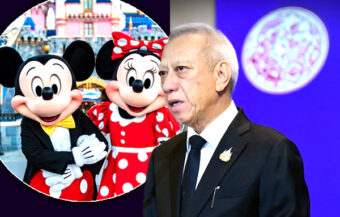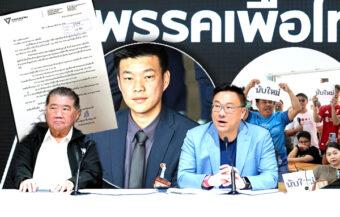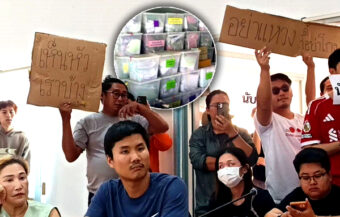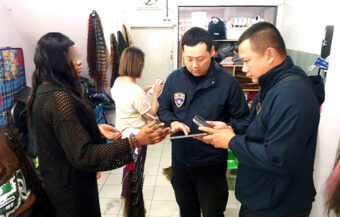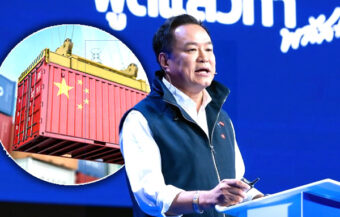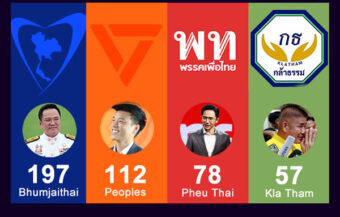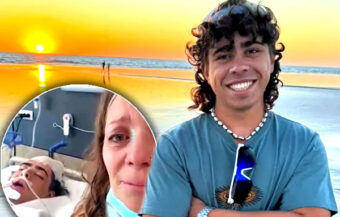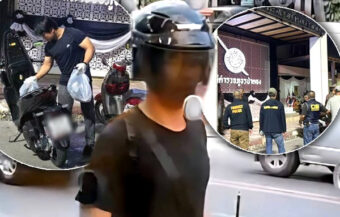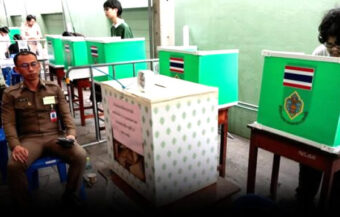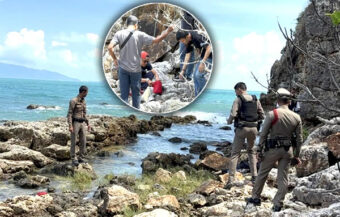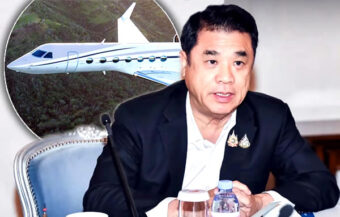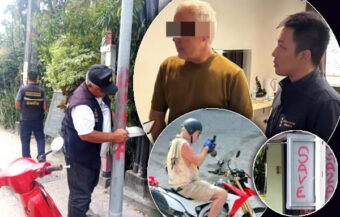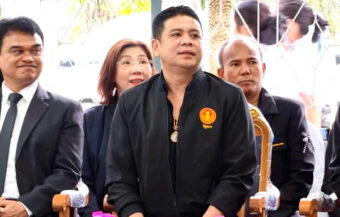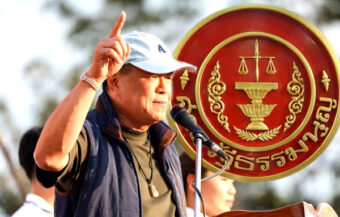People’s Party MP says he was physically intimidated and forcibly silenced in Parliament while exposing Senate collusion, as the ongoing investigation into 138 senators and more than 90 Bhumjaithai Party members now moves towards possible full legal court proceeding.
A People’s Party MP and deputy leader on Monday slammed Parliament for failing to take the Senate Collusion scandal seriously. Dr. Wayo Asawarungruang was cut off mid-speech while raising the issue before the House of Representatives. He later revealed he was physically intimidated inside Parliament—pushed to the ground for speaking out. His explosive claims came as Election Commission Chairman Itthiporn Boonprakong confirmed that an investigation implicating 138 senators and more than 90 members of the Bhumjaithai Party had entered a new phase. As of September 17, the case is now one step away from a full legal showdown, with the Commission set to decide whether to press charges in court.
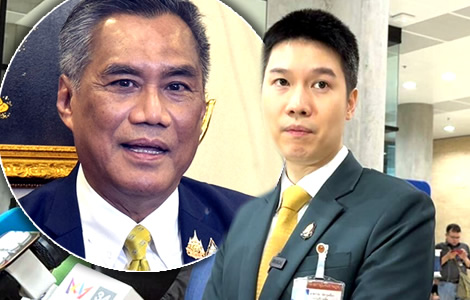
A senior People’s Party MP has demanded that authorities intensify focus on the ongoing investigation into alleged Senate‑election irregularities. The probe is underway at both the Election Commission and the DSI. Dr. Wayo Asawarungruang, a deputy party leader, spoke out forcefully. The MP said he had faced intimidation after raising the issue in Parliament. Certainly, he insisted he holds powerful evidence demanding scrutiny.
For instance, he said he personally reviewed charge sheets, raw statistical data, and overlapping evidence. Moreover, he argued these compelling documents show that something was deeply wrong in the 2024 Senate poll. Dr. Wayo insisted the probability of serious irregularity was extremely high.
He noted that multiple data layers align in suspicious ways. He maintained that the convergence of these layers magnifies the credibility of the claim.
MP describes being pushed to the ground and silenced in Parliament while trying to expose collusion
The MP also described the threats he encountered. Dr. Wayo said that while speaking in Parliament, someone pushed him, and he fell. He added that he was left shaken and fearful. Furthermore, he said he was barred from continuing the debate by the presiding chairman.
As a result, he curtailed the discussion to at least let the public hear the beginning. The People’s Party representative lamented that he couldn’t finish exposing half the information he had amassed.
Dr. Wayo furthermore recalled efforts to meet those who threatened him. He said he waited in a dining room, with friends accompanying him for safety. However, the individuals failed to show. He then withdrew for fear of further confrontation. He claimed the pattern of harassment aimed to silence him. Yet he remains determined to press on.
He gave more details on the evidence he holds or expects to hold. He noted the first layer comprises results that deviate statistically from norms. Next, the second and third layers consist of overlapping telephone routes and communication maps.
MP outlines four layers of evidence, including phone routes, statistical anomalies, and data overlap
Then, a fourth layer may involve financial transactions or transfers. He said these layers, when merged, generate a three‑dimensional composite image. Notably, this composite image supports his assertion of collusion.
He conceded he does not personally possess every single record. Yet he firmly believes DSI and EC may hold fuller datasets. Also, he admitted some of his own raw data came from public sources and whistleblowers. He praised civil groups like iLaw. They provided images sharper than those of the EC, he claimed. Consequently, he used them to cross-check his own findings.
He singled out “yellow slips” as crucial evidence. He said one such slip listed 21 identical numbers across multiple candidates. In that case, probability alone could not explain the alignment. He emphasised that cheat sheets are not illegal per se. Instead, they become suspect when layers of data overlap abnormally. Thus, such overlaps demand rigorous inspection.
When asked whether his data implicated Bhumjaithai Party figures, he replied cautiously. He said his information is limited and inconclusive on that point. However, he acknowledged that multiple versions of cheat sheets suggest wider coordination.
MP links discarded cheat sheets to prep groups and urges government to allow investigation independence
He speculated that some sheets might have been discarded in public spaces. Later, they were leaked or recovered. He further said that once winners were known, investigators traced the sheets back to preparatory groups. That, he insisted, shows that irregularities were real.
He called on Prime Minister Anutin Charnvirakul to fulfil the People’s Party’s agenda. One priority, he said, was dissolving Parliament and returning power to the people.
He asserted the party would not abandon this investigation. Instead, they would continue pressing for transparency and justice. He urged that the government refrain from interference or obstruction.
Dr. Wayo also questioned why the EC had delayed substantive action. The MP said the case has been with the commission for weeks. He asked, “What are they waiting for?” Consequently, he insisted the public deserves answers now—not later. He warned that further delay would erode confidence in institutions.
On that same day, EC Chairman Itthiporn Boonprakong confirmed that the Senate collusion case has moved to its adjudication subcommittee. On September 17, the EC forwarded the matter for decision on legal proceedings. The current stage allows 90 days for review. The full commission will later vote on whether to proceed. However, Mr. Itthiporn emphasised the need for thoroughness.
Election Commission outlines four-step process and stresses the importance of fairness and due process
He said the case involves hundreds of defendants and thousands of pages of documents. Therefore, the EC must meticulously study every piece of evidence. Moreover, it must verify statements carefully before reaching conclusions. He warned against decisions made in haste or based on emotion. Otherwise, he said, the process would be unfair or improper.
He described the EC’s four‑stage process. First, investigators formed the 26th Investigation and Inquiry Subcommittee. That body had a four‑month (120‑day) mandate to gather data. Second, the case moved to the EC Secretary‑General, who had 60 days for an opinion—this was completed in July. Third, on September 17, the EC sent it to the adjudication subcommittee under a 90‑day window. Fourth, after subcommittee review, the full EC will decide whether to file charges.
He reminded observers that, historically, the commission has reached final decisions within about 15 days after receiving subcommittee reports. Thus, if the current schedule holds, the matter may evolve rapidly. Nonetheless, he said, the priority must be fairness and due process.
Past committee recommendations highlight scale of collusion and show resistance within Parliament
Previously, a committee had already recommended legal action against 138 sitting senators and more than 90 Bhumjaithai Party members, including party executives. Dr. Wayo interpreted that as proof that the allegations are not empty noise.
He also expressed concern about internal resistance within Parliament. For example, he said some senators protested before he had even finished speaking. That, he suggested, revealed anxiety among implicated parties.
Dr. Wayo insisted that his remarks were not personal attacks, but academic and data‑driven analysis. He said he did not name names or make slanderous claims. Instead, he focused on patterns, anomalies, and probability models. However, he was prevented from finishing his remarks. That, he said, was a missed opportunity for transparency.
Despite this, he promised not to relent. He said he would find new platforms to release his findings. He guaranteed further disclosures when the time is right. Moreover, he stressed that this fight is about accountability—not partisan positioning. “We want fair elections,” he said. “We want a system where no one is above the law.”
Public scrutiny and institutional independence are crucial as EC and DSI proceed with review of the evidence
He cautioned that the public will closely watch how the EC and DSI proceed. If institutions delay, society’s trust may fray. He demanded that the government allow full independence in the investigation. Meanwhile, Chairman Itthiporn reaffirmed that the EC is acting without external influence. He pledged that every step follows legal norms. He insisted that they will not be hurried, yet they will not stall without cause.
2024 Senate election enquiries into collusion are a problem for new Prime Minister Anutin Charnvirakul
In the days ahead, the adjudication subcommittee must finalise its review. Then the EC must decide whether to file formal charges. If it does, legal proceedings will follow. If it does not, critics will claim the case was buried. Either way, the outcome will deeply affect public confidence in Thailand’s electoral integrity.
The showdown may soon be at hand. The evidence, the personalities, and the institutions all converge now. The question is whether truth will emerge. Or whether the system will shield itself. The nation is watching.
Join the Thai News forum, follow Thai Examiner on Facebook here
Receive all our stories as they come out on Telegram here
Follow Thai Examiner here
Further reading:
Election Commission moves forward steadily with Election Collusion case linked to Bhumjaithai Party
Bombshell news as Bhumjaithai Party leadership is summoned by Election Commission over Senate poll




